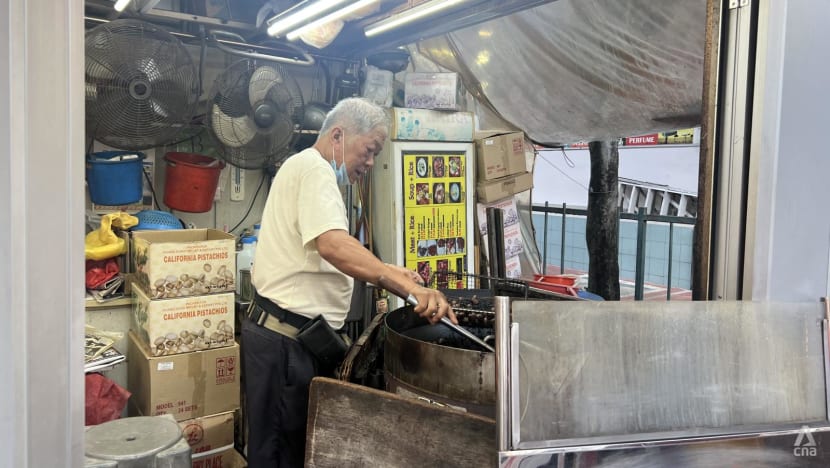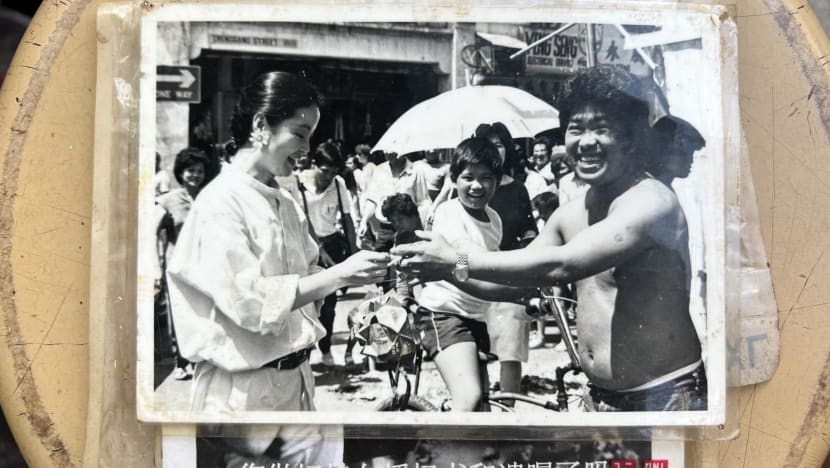'The trade will die out soon': Roasted chestnut hawkers a rarity as sellers age
Meet Uncle Black, who sells roasted chestnuts along Trengganu Street, and has been plying his trade for about 50 years. He shares his story with CNA.

Mr Toh, known to his regulars as Uncle Black, roasting chestnuts at his stall along Trengganu Street. (Photo: CNA/Ang Hwee Min)
SINGAPORE: For those who frequent Chinatown, the smell of roasted chestnuts is a familiar one.
Walking down Trengganu Street, the sweet, smoky aroma fills the air as you approach Bugis 102 Roasted Chestnut. A man known to his regular customers and friends as Uncle Black or Ah Orh, stands over a gigantic metal pot with a rotating arm, closely inspecting his wares.
The 68-year-old stallholder is Mr Toh, who declined to give his full name as most people know him as Uncle Black.
Uncle Black has been selling roasted chestnuts for about 50 years. Though he cannot remember the year he became a hawker, he recalls his first setup was a stall located nearby in the 1970s.
In the pot, chestnuts in their brown shells roll around gently in pitch-black coarse sand. The sand doesn’t start black, Uncle Black explains, the sugar added to the chestnuts while roasting gives it that colour.
Uncle Black stares into the pot and using his bare hands – hardened from years of experience – picks out the hot chestnuts that have cracked open while roasting.
“Last time, the older hawkers would tell you they were using coffee beans. It’s a lie, they just didn’t want people to copy their trade,” he said with a laugh.
“I was also one of the first to order a pot that can stir the chestnuts automatically. Back in the day, no one wanted to buy from you if you didn’t roast them by hand, but eventually people got used to it.”
Roasted chestnut hawkers made the news after one was fined S$27,600 (US$20,800) for illegal street hawking.
Between 2019 and 2023, Tan Hee Meng sold roasted chestnuts illegally near bus stops in Ubi and Bedok, a hawker centre in Eunos, and other locations at East Coast Road, Onan Road and Marine Parade Central.
If he cannot pay the fine, Tan will have to serve a 36-day jail term.
The 62-year-old was previously convicted in 2018 for similar offences and was fined S$3,600.
Unregulated street hawking poses a risk as the food sold may not meet safety requirements, the Singapore Food Agency said.
"Such vendors are transitory and cannot be traced if buyers face problems with their purchases," the agency said. "Through such modes of sales, these illegal street hawkers are in effect passing risks to the unsuspecting consumer to bear."
After Tan’s case made the news, many netizens expressed sympathy for him and shock about the amount he was fined.
Roasted chestnut street hawkers come under a government scheme that gives them a licence to sell at fixed public locations without paying rent. Other than roasted chestnuts, they may also sell items like newspapers, canned drinks and tissue paper.
Responding to queries from CNA, the Singapore Food Agency said licensing ensures that street hawking does not “adversely affect” residents, businesses and others.
"Numerous enforcement actions" had been taken against Tan and he showed a "clear disregard for the law", it added.
FROM ILLEGAL TO LEGAL
When asked about Tan’s case, Uncle Black said he was acquainted with him, and knew he had been hawking illegally for a while.
“I know all the roasted chestnut hawkers around. Many of them do it illegally now, but they’re very smart about where to go and how to escape the officers,” he said in Mandarin.
“They also use a much smaller pot, makes it easier to pack up everything and run. If they don’t know who I am, that means they’re really a newcomer.”
Uncle Black said he started as an illegal hawker, selling fruits such as durians and pomelos, depending on the season.
In the 1980s, he became a street hawker in Bugis, which is the origin of the name of his stall.
“The stall was very small, and selling durians meant I’d have to find a bigger space, hire workers to help me. I wasn’t sure I could make that money, and I already had the skills for roasting chestnuts, so I decided to sell that instead,” he said.
At his stall in Bugis, Uncle Black even met the late former President Wee Kim Wee in the 1980s, who, after seeing his automatic roasting machine, remarked that even Singapore’s hawkers were benefiting from technological advancements.
Teresa Teng is another memorable customer for Uncle Black, he said, as he shares a photo of his younger self with the late Taiwanese singer.

Uncle Black married at the age of 40 and does not have children. “I was so busy selling chestnuts, and the years passed, I 'forgot' to get married,” he added with a wry smile.
When asked whether he plans to find a successor, he said several people, young and old, have approached him to ask about taking over his business.
"But they don't last long. Especially young people, they're more educated and want to sit in an office. It's so hot and tiring to stand here and roast chestnuts, most people can't handle it,” he added.
“There aren’t many people selling roasted chestnuts anymore. I think the trade will die out soon.”
Now, he pays S$3,000 in rent for his stall along Trengganu Street. Each day, he earns about S$100 selling roasted chestnuts, dried persimmons, as well as other snacks and wares.
“Some days are better than others, like on weekends or on holidays. Of course, I still have my regular customers, but it’s more of the older folks. Young people don’t know how to enjoy roasted chestnuts,” he said.
“I can’t take breaks, because if I’m not here I can’t sell anything. I don’t take holidays. Even for dinner, my friends around help me to buy food.”
Currently, he sells 250g of roasted chestnuts for S$6 a bag, up from S$5 last year – the war in Ukraine prompted his supplier to increase prices and he was forced to follow suit.
“I haven’t really thought about quitting, I’ll just work until I can't.”
















